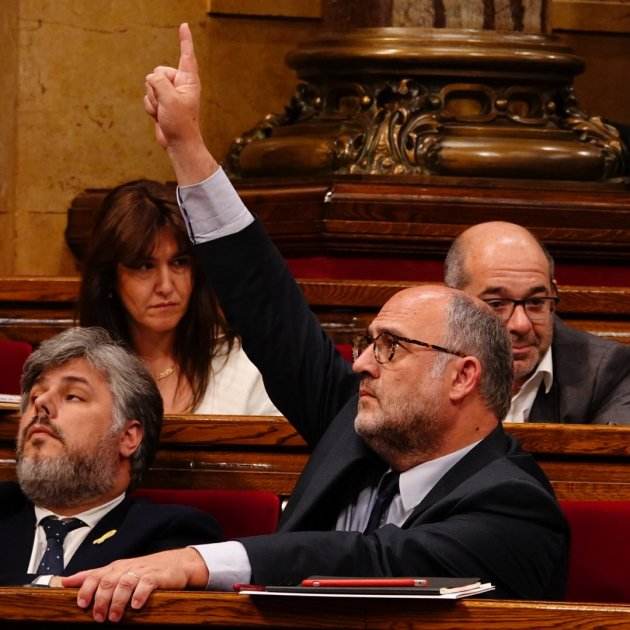The Catalan Parliament can now invest a president without them being present in the chamber. The measure was approved by an absolute majority of the plenary session this Friday lunchtime after a debate on the reform to the Law of the Presidency proposed by JxCat. Now all eyes turn to Madrid, where Spanish prime minister Mariano Rajoy had already said he wouldn't let the ink dry before presenting an appeal to the Constitutional Court. Then to Berlin, where Carles Puigdemont has this Saturday called a meeting of deputies from his party to tackle the final stretch of the struggle to invest a president.
The reform was passed with 70 votes in favour from the three pro-independence parties, JxCat, ERC and CUP. The other groups (Cs, PSC, CatECP and PP) directly opposed it. It was a tense debate, marked not only by the suspension of Puigdemont's candidacy for investiture by the Constitutional Court, but also by the path chosen to enact the measure: passing it in a single reading under extraordinary urgency procedures. Before the debate started, Cs' spokesperson Carlos Carrizosa asked for the Council of Statutory Guarantees' judgement to be read. An amendment from the party to withdraw the proposal was voted down.
Albert Batet (JxCat) in Parliament today. Photo: Roberto Lázaro.
The proposing party, JxCat, is holding firm that Puigdemont has legitimacy to be the candidate for investiture as president. "If this proposal had been made in 2005 or 2011, there wouldn't have been any problem," said deputy Albert Batet, "it's being questioned because it makes something simple but important very clear: who leads in Catalonia? Where does sovereignty lie? Who wins, democracy or repression?".
Batet, who is also mayor of the small town of Valls (Tarragona), went on to say: "the reality in Catalonia is that those who were defeated haven't accepted the results of the election and want to win in the courts what they didn't win at the ballot boxes". He warned that "the majority of the people of Catalonia [which is] against the repression will not give up".
For ERC, Antoni Castellà admitted it won't help to invest Puigdemont. He said it wasn't a technical debate, in which he believes there would be unanimity, but a debate as to "whether the Spanish political system and part of this chamber accept the result of a democratic election". Despite the state "attacking" the law, he warned that the Catalan people has survived repression on many occasions and will do the same facing the current regime.
Maria Sirvent (CUP) defended her vote in favour of "all those initiatives which seek to widen civil and political rights". She called for the state's "meddling" to be ignored. "We've come to this Parliament to do politics," she said.
Inés Arrimadas (Cs) at the lectern. Photo: Roberto Lázaro.
“Legal, political and parliamentary atrocity”
Across the chamber's aisle, the measure found direct resistance from the opposition parties. Cs' president, Inés Arrimadas, baptised it the "Puigdemont Law", describing it as a "legal, political and parliamentary atrocity". She said the reform "seeks impunity for politicians, that they can completely ignore the law and then take office without fulfilling the obligations".
For PSC, leader Miquel Iceta started saying he couldn't remember any judgement from the Council of Statutory Guarantees "as conclusive as this one". He asked for his fellow deputies to think of the country and all its citizens and "how best to serve the general interest". He warned that "without respecting the laws and forms there is no democracy".
The leader of CatECP, Xavier Domènech, asked the pro-independence parties "why [they] do so many things which don't lead anywhere". He urged them to "do things which help us to leave the situation we're in". He emphasised that Catalonia doesn't have a system entirely focused on the president and that the Parliament has to look for an alternative candidate to Puigdemont. "It's never just for a people to sacrifice itself for one man," he said.
Finally, PP deputy Santi Rodríguez warned that "the laws cannot be at the service of one person". In similar terms to the other groups, he criticised the reform for looking to "enable a person who has failed in their obligations" to be invested president.
CatECP deputies (L-R) Xavier Domènech, Elisenda Alamany and Jèssica Albiach. Photo: Roberto Lázaro.
Straight to Court
There was no cliffhanger, the next plot beat was known even before the plenary session started today. As Rajoy said on Thursday, the next step will be an appeal by the Spanish government to the Constitutional Court. The state's legal services had the appeal ready days ago so they could present it as soon as the Catalan chamber gave the green light to the bill.
Now the focus turns again to Berlin, and tomorrow's meeting between Puigdemont and his deputies. Time is running out: they have until 22nd May to invest a president or the Parliament is automatically dissolved and new elections are called.
